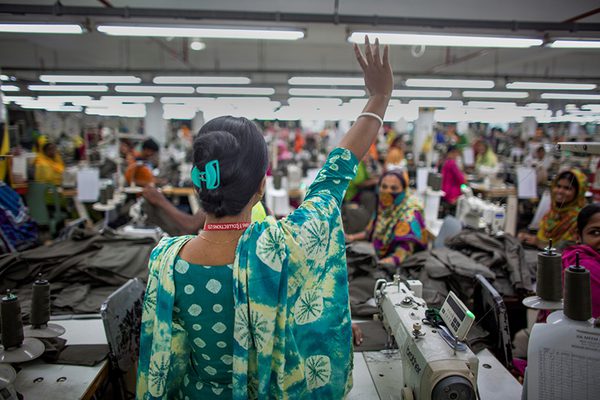Protecting Wages of Migrant Workers in the Gulf
8 October 2019

Last Wednesday Engineers Against Poverty published its latest report on Protecting the Wages of Migrant Construction Workers in countries of the Gulf Cooperation Council (GCC). Scrutiny over the plight of migrant workers in the region continues, and our report responds to the need to deliver new innovations to ensure construction workers receive the wages owed to them, in full and on time.
The report looks beyond traditional measures introduced in some countries in the region, such as the Wage Protection System (WPS) - an electronic salary transfer system which pays wages directly into workers’ bank accounts and thus provides evidence of when wages have (or have not) been paid. Whilst the WPS has helped to resolve wage disputes, it has failed to significantly reduce them or serve as a deterrent against late, partial or non-payment of wages.
To address current gaps in these measures, our report explores initiatives to protect construction worker wages in China, the EU, US and Latin America and finds an underlying thread – that of extending liability for wages beyond the immediate employer in subcontracting chains. This means that if a subcontractor does not fulfil their obligations regarding wage payment, the main contractor can be held liable for this debt.
Shared responsibility for wage payment is key to supporting migrant construction workers in the Gulf Cooperation Council.
Shared responsibility for wage payment has two key benefits: the first that it provides an alternative source of wage payment if workers have not been paid, and the second that it requires contractors, who can be held liable, to take greater responsibility for a subcontractor’s actions.
Sparking Responsibility Throughout the Supply Chain
In individual EU states and Latin America, spreading liability for wages has provided a strong deterrent effect to late, partial or non-payment of wages to construction workers. The threat of being held liable incentivises main contractors and project owners to only subcontract with reliable parties, and to ensure all workers on their projects receive the wages due to them on time.
In Germany, France and Spain, such measures also include regular checks that wages have been paid by requesting copies of bank statements or payslips. In Argentina, if the main contractor fails to request proof of compliance of labour obligations by the subcontractor, then the main contractor is held liable for the debts of the subcontractor. In Brazil, labour courts can extend the liability over labour obligations to companies that belong to the same corporate group, so that the entire group respond to labour debts contracted down in the supply chain.
By adapting these legal arrangements to the context of the GCC, a mighty incentive would be provided to refrain main contractors and project owners from subcontracting with non-reliable subcontractors.
The Special Case of Labour Suppliers
Labour suppliers are largely responsible for providing temporary workers to contractors in the GCC and often these are small companies that lack funds to pay wages as they have not been paid by the user company themselves, making late or non-payment of wages is more likely to occur.
Our report therefore recommends a focus on extending liability for wages to the users of the labour suppliers in the GCC. Yet we recognise the need for measures appropriate to the context - one such approach would be to ensure that companies supplying labour have a licence and comply with certain obligations. A key obligation would be that they have sufficient funds to pay wages if there are gaps in contracts or a delay in receiving payment from users.
Our report recommends extending liability for wages to the users of the labour suppliers in the GCC.
Instigating Change, Step by Step
Whilst arguing for these measures, we recognise that there is strong support for business in the GCC and passing legislation to extend liability to contractors may prove controversial. Therefore we outline acceptable alternatives which extend protection for workers whilst bypassing the need for such legislation.
One such possibility would be to place legally enforceable obligations on contractors to ensure all workers are paid according to the WPS, in a step-by-step approach. This would be a relatively easy first step to ensuring coverage is significantly expanded and could be enforced by sanctions against the main contractor if a wage dispute arises, and the employer is not enrolled in the WPS.
Change could happen by combining preventive tools with sanctions and providing strong incentives for behaviour change from contractors.
If these measures were adopted, an effective method of providing redress for workers who have not been paid would still be needed. Setting up a wage fund to reimburse workers if immediate employers do not have the funds to pay (or refuse to pay) is an essential requirement of any WPS, but it is not yet clear that all GCC states have set up such a fund. In Qatar it is clear that the insurance fund is not yet operational.
There is still much which should – and can – be done. The measures we outline in our latest report show how change could happen: by combining preventive tools with sanctions and providing strong incentives for behaviour change from contractors. By instigating more responsible approaches to subcontracting, a real opportunity presents itself to ensure migrant construction workers are paid as and when they should, in full and on time.
Photo credit: Flickr/Mike Coghlan



